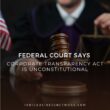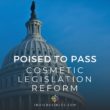[This letter is being sent via fax to Chairman Leibowitz today.]
The Honorable Jon Leibowitz
Chairman
Federal Trade Commission
Dear Chairman Leibowitz:
I am the founder and CEO of Indie Business Media, and the Indie Beauty Network, a trade organization representing 800+ small health, beauty and lifestyle companies. As an advocate for small and independent business owners nationwide, I am pleased to offer my position on the Guides Concerning the Use of Endorsements and Testimonials in Advertising, issued by the Federal Trade Commission (FTC) on October 5, 2009. Shortly after they were issued, I posted a high level overview summary of the Guides in layperson’s terms. This letter shares my concerns about how the Guides apply to small and independent business owners – concerns which are shared by millions of people nationwide.
Introduction
I am very concerned that the Guides are unfairly harmful to individuals and small businesses owners who use blogs to communicate efficiently and cost effectively with their friends, customers and other stakeholders. While I think everyone generally supports the FTC’s efforts to encourage truth in advertising, testimonials and endorsements, these Guides are too broad to address the problems sought to be curtailed. Instead, they unnecessarily limit the free speech of consumers and small and independent business owner users of social media, without any corresponding benefit to the public.
In many ways, I agree with the October 15 open letter addressed to you by Randall Rothenberg of the Interactive Advertising Bureau. His position is well articulated, particularly as it concerns the ad supported interactive media industry. But my concerns are slightly different because they concern people who use social media in ways that are not generally ad supported. In other words, they are not “bloggers” in the sense that their blogs in and of themselves generate income. Instead, they are either consumers who enjoy blogging for fun and enjoyment, or they are small business owners who use blogs and other social media tools to communicate with customers and other stakeholders about the products and services they offer.
The Media
While it may be early in the evolution of “social media” or “blogging” to call either “industries,” either collectively or unto themselves, the reality is that they are playing increasingly vital roles in domestic and worldwide commerce. In many ways, the entire “media” industry can be divided into at least these three categories:
- Traditional Media: corporate-owned cable systems and broadcast television and radio stations that are regulated by the Federal Communications Commission; and corporate-owned print newspapers and magazines;
- New Media: entities, whether or not they are traditional media as defined above, whose income is fully or meaningfully partially dependent on their use of social media, and where an “entity” is anything from a large corporation to an individual working on a laptop at a local coffee shop; and
- Individual New Media Users: consumers and small and independent business owners who use traditional and new media tools to communicate, but who do not rely to any meaningful extent on either to generate income or make a living.
While these categories overlap some, and each is (and will always be) in a state of flux, I believe the new Guides do the greatest disservice to the third category, composed largely of people whose proportionate impact on the public is so small that they cannot be reasonably expected to comply with the Guides as currently written, nor should they have to.
This category includes consumers in the traditional sense, as well as consumers who are also very (and I mean “very”) small business owners. I call these persons “consumer-business owners” or “indie business owners” because they are neither wholly consumers nor wholly business owners. Instead, they are a self-contained intersection between consumers and business owners. As such, they cannot and should not be treated entirely as one or the other, and they should not be subjected to the Guides to the same extent as those in any other category.
The Unnecessary Adverse Impact on “Consumer-Business Owners”
Over the last decade, federal regulators across the board have had to deal with a new type of stakeholder: the “the consumer-business owner”. These people participate in regulated industries to the same extent as multi-national corporations, yet their interests are very different. These differences give rise to the need to regulate consumer-business owners differently from other interested industry participants.
For proof of this, one need look no further than the passage and implementation of the Consumer Product Safety Improvement Act of 2008 (CPSIA). Signed into law by former President Bush on August 14, 2008, the CPSIA establishes safety requirements for products intended primarily for children 12 years of age or younger. In particular, the law treats as a banned hazardous substance products that contain more than an acceptable level of several substances, including lead. Because the law is not carefully tailored, it adversely impacts consumer-business owners who did not contribute to the overall problem of lead in children’s products. The result is that thousands people who manufacture or resell products in tiny numbers were forced out of business for no good reason, and in the midst of the worst financial crisis our nation has seen since the Great Depression.
Many other pieces of pending federal legislation could have a similar devastating effects on consumer-business owners who do not contribute to the problems sought to be curtailed by the legislation. Among them are the following:
(1) The FDA Globalization Act of 2009: introduced by Congressman John D. Dingell (D-MI) on January 28, 2009
(2) The Safe Baby Products Act: introduced by Senator Kirsten Gillibrand (D-NY) on April 28, 2009
(3) The Food Safety Enhancement Act of 2009: introduced by Congressman John D. Dingell (D-MI) on June 8, 2009
(4) The Household Product Labeling Act: introduced by Senator Al Franken (D-MN) on September 23, 2009
In years past, bills like these would be fully vetted by all affected stakeholders because the affected stakeholders were generally well funded private or publicly traded companies and non-profit consumer groups with powerful lobbying arms. As a result, everyone had an opportunity to share how the proposed law, if passed, would impact their businesses and constituents.
Today, new legislation and Guides such as those at issue here impact more than just well funded companies. They impact an entirely new category of stakeholders –consumer-business owners. And because of their size and proportionate lack of resources, these affected parties are without the resources to speak up when new laws are pending. When they go into effect, they are often blind-sided and without the resources to comply. As a result, these tiny entities, which are not the source of the problem sought to be addressed in the legislation, are decimated and forced to shutter their doors. The unfair effects are devastating and far-reaching.
While the new FTC Guides do not have the full force and effect of law, it is clear that they can be used by the federal government to form at least a part of the basis for prosecution of a consumer-business owner. They apply with absolute equal effect to the largest new media company in the nation to the smallest individual new social media user in the smallest corner of every state in the union. And that, Mr. Leibowitz, is unfair and unnecessary.
Interestingly, as pointed out in my overview summary, the Guides do not seem to apply to the first category of media: corporate-owned cable systems and broadcast television and radio stations that are regulated by the Federal Communications Commission; and corporate-owned print newspapers and magazines. This discrepancy is also noted in Mr. Rothenberg’s letter.
It seems patently unfair that the FTC deems it necessary to promulgate new guidelines to constrain the rights of individual consumers and tiny business owners, while failing to address the segment of the industry with the most power to use new media tools to do the most harm to the most people.
While it may be necessary to clarify the FTC’s Guides since they have not been updated since 1980, I believe that any amendments should be carefully scrutinized to ensure that individuals and indie business owners are not adversely affected for no good reason. It is clear that such scrutiny did not occur in this case, nor did individuals and consumer-business owners who are affected have any meaningful opportunity to participate in the process and inform FTC staff about how the new provisions would impact them.
Possible Alternatives
If the FTC is determined to move forward with new Guides, I suggest that there are far less burdensome ways to protect consumers, ways that are less threatening to consumers and consumer-business owners and far more solution-oriented. I strongly urge you to re-think your approach to adopt the least restrictive means to accomplish legitimate consumer protection goals.
For example, there is no good reason to require the same level of disclosure for consumers and consumer-business owners with a miniscule audience, whose income is not meaningfully partially dependent on their blog or other social media outlet. Without disturbing the intent of the Guides, or the laws they interpret, and without endangering consumers, the Guides can be tailored to realistically reflect the proportionate risk these types of social media users actually present. In fact, they could, and perhaps should, contain an exemption for social media users who fit this category.
Additionally, federal laws and regulations are often extremely difficult for experienced attorneys to understand and apply, let alone a indie business owners and consumers who are treated the same as huge companies for no good reason. Since the FTC is issuing Guides to address the behavior of people using new media tools, why not use those same tools to create meaningful dialog between FTC staff and the public so all affected parties can participate in the process.
The new Guides can and should include provisions to use new media tools to host teleconferences, webinars and working sessions to, in the first instance, provide an opportunities for real people to inform FTC staffers about how they are using social media tools. In this way, staffers would understand first-hand how unnecessarily constraining the new Guides are to consumers and consumer-business owners.
The Guides could also include the establishing of an “ombudsman” or other type of liaison so small businesses can get the help they need to understand and apply the Guides going forward in a rapidly technologically evolving world.
Conclusion
As you consider all of the feedback you are now receiving, I respectfully request that you acknowledge and invite the participation of consumers and consumer-business owners who are impacted by your actions. I and many people in this category are prepared to work with FTC staff and the media industry as a whole to achieve our shared goal of protecting consumers from unfair and misleading advertising. However, we believe that the one-size-fits-all approach contained in the Guides falls miserably short of what the FTC needs to do to achieve this goal.
I look forward to working with you.
Sincerely,
Donna Maria Coles Johnson
CEO, Indie Business Media
Founder, Indie Beauty Network



